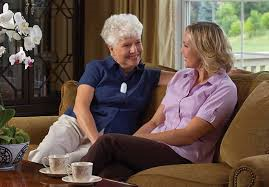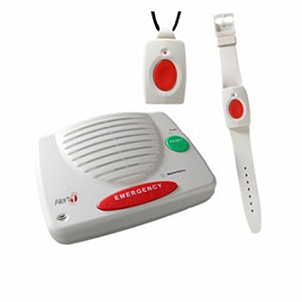1-resized-600.jpg) Many of us have parents who live alone, and we’re always concerned about their safety. What if they fell and no one was around to help?
Many of us have parents who live alone, and we’re always concerned about their safety. What if they fell and no one was around to help?
There are a wide variety of medical alert systems on the market that can help in case of a fall or other emergency.
How do medical alert systems work?

Medical alert devices are typically worn as a waterproof pendent or bracelet, with an SOS button that can be pushed in case of a fall or other emergency. The system also includes a base station, which connects to the home telephone line, and will automatically dial a 24/7 call-monitoring center or any other emergency number of your choice.
What types of medical alert devices exist?
Monitored Alerts
 Monitored Alerts are the most popular medical alert devices. These will connect your loved ones with a 24/7 emergency monitoring service each time they press the SOS button. Using the medical alarm console, they can reach a trained operator within just a few seconds. If the operator is unable to speak to the person, he/she would immediately call the hospital and dispatch the paramedics, as well as notify any relatives. Most of these systems also offer “lockbox” services, providing a locked console for the owner’s keys to their home. An operator will give the combination to emergency responders if the owner is unable to answer the door.
Monitored Alerts are the most popular medical alert devices. These will connect your loved ones with a 24/7 emergency monitoring service each time they press the SOS button. Using the medical alarm console, they can reach a trained operator within just a few seconds. If the operator is unable to speak to the person, he/she would immediately call the hospital and dispatch the paramedics, as well as notify any relatives. Most of these systems also offer “lockbox” services, providing a locked console for the owner’s keys to their home. An operator will give the combination to emergency responders if the owner is unable to answer the door.
Most of these devices work outside the house too, anywhere from 600 to 1500 ft. away.
For this option, you are obligated to stay subscribed to the system in order to have access to the 24/7 emergency monitoring services. The fee is around $20 to $40 per month, and you usually have to sign a contract for at least one year. Some systems may also include an activation and/or cancellation fee.
There are dozens of companies that provide emergency monitoring services. You can compare pricing and options here.
No-Fee Alerts
No-Fee Alert is the cheaper option, but it doesn’t have a professional monitoring system. These products also have an SOS button and a home base station, but they are programmed to dial personal contacts instead of an operator from an emergency center. The device stores several phone numbers (relatives, friends, caregivers, or 911), and the system dials each number until somebody responds. These devices cost anywhere from $150 to $350, with no ongoing monthly fees. You can learn more about these systems here.
Mobile Alerts
 There are several mobile products with GPS tracking that will allow your loved one to call for help from anywhere. These devices are also pendent-style with an SOS button. When your family member presses the button, an operator from the emergency monitoring center will be able to see their exact location. This option is critical in emergency situations.
There are several mobile products with GPS tracking that will allow your loved one to call for help from anywhere. These devices are also pendent-style with an SOS button. When your family member presses the button, an operator from the emergency monitoring center will be able to see their exact location. This option is critical in emergency situations.
Mobile medical alerts devices cost anywhere from $200 to $600 for the first year, including equipment costs and monthly fees. Most of these systems are rechargeable.
Is it covered by Medicare?
Medicare and most other insurance plans don’t cover medical alert systems, even with a doctor's prescription.


1-resized-600.jpg) Many of us have parents who live alone, and we’re always concerned about their safety. What if they fell and no one was around to help?
Many of us have parents who live alone, and we’re always concerned about their safety. What if they fell and no one was around to help?
 Monitored Alerts are the most popular medical alert devices. These will connect your loved ones with a 24/7 emergency monitoring service each time they press the SOS button. Using the medical alarm console, they can reach a trained operator within just a few seconds. If the operator is unable to speak to the person, he/she would immediately call the hospital and dispatch the paramedics, as well as notify any relatives. Most of these systems also offer “lockbox” services, providing a locked console for the owner’s keys to their home. An operator will give the combination to emergency responders if the owner is unable to answer the door.
Monitored Alerts are the most popular medical alert devices. These will connect your loved ones with a 24/7 emergency monitoring service each time they press the SOS button. Using the medical alarm console, they can reach a trained operator within just a few seconds. If the operator is unable to speak to the person, he/she would immediately call the hospital and dispatch the paramedics, as well as notify any relatives. Most of these systems also offer “lockbox” services, providing a locked console for the owner’s keys to their home. An operator will give the combination to emergency responders if the owner is unable to answer the door. There are several mobile products with GPS tracking that will allow your loved one to call for help from anywhere. These devices are also pendent-style with an SOS button. When your family member presses the button, an operator from the emergency monitoring center will be able to see their exact location. This option is critical in emergency situations.
There are several mobile products with GPS tracking that will allow your loved one to call for help from anywhere. These devices are also pendent-style with an SOS button. When your family member presses the button, an operator from the emergency monitoring center will be able to see their exact location. This option is critical in emergency situations.
 Tweet
Tweet
 Share
Share



